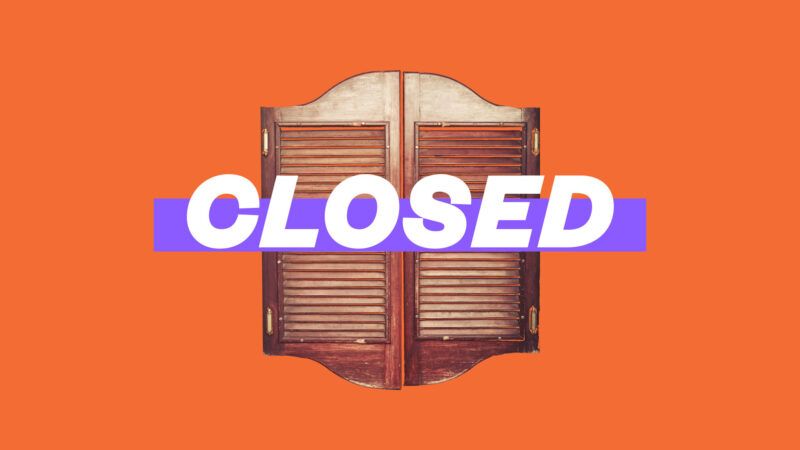In the Face of Arrests, City Barricades, and Revoked Permits, This California Saloon Fights for Its Right To Reopen
For months, the owners of Tin Horn Flats have refused to comply with restrictions on their business.

Baret Lepejian has taken the wild west theme of his restaurant in Burbank, California, to heart. For months he has refused to comply with pandemic restrictions, even in the face of mounting sanctions.
In December, Lepejian reopened his family-run Tin Horn Flats Saloon for outdoor dining as a self-described "peaceful protest" against Gov. Gavin Newsom's Regional Stay at Home order, which required restaurants to cease onsite dining for close to two months.
"I'm going to lose my business anyway….So fuck it," he told Eater at the time.
Lepejian was hardly alone in refusing to comply with Newsom's regional stay-at-home order. Across the state, business owners have said they'd keep their doors open, whole towns have refused to comply with the directive, and sheriff's departments have said they wouldn't enforce it.
What makes the Tin Horn Flats case unusual is the degree to which both the Lepejians and the city have been willing to go to war.
Almost immediately after the restaurant reopened, the Los Angeles County Department of Public Health suspended Tin Horn Flats' health permit. Lepejian and his family kept operating anyway. The county then performed close to 30 public health inspections at Tin Horn Flats over the ensuing month, documenting violations each time.
On January 25, Newsom lifted his regional-stay-home order, which allowed outdoor dining to resume statewide. Other state and local restrictions on indoor dining have since eased as the number of COVID-19 cases, hospitalizations, and deaths dropped considerably in Los Angeles. Today, restaurant dining rooms are allowed to operate at 50 percent countywide.
But that brought little relief to Tin Horn Flats. Two days after the stay-at-home order was lifted, Los Angeles County fully revoked the restaurant's already-suspended health permit and required it to stay closed until it acquired another one. In late February, the Burbank city council revoked a conditional use permit the restaurant needed to operate.
Still it stayed open. Within minutes of the city council's decision, Tin Horn Flats' social media accounts blared a message: "We WILL NOT COMPLY."
The situation has only escalated since then. Both Los Angeles County and the city of Burbank have sued Lepejian and his company, Barfly Inc., through which his family owns Tin Horn Flats.
In mid-March, a Los Angeles Superior Court gave the city the ability to shut off power to Tin Horn Flats, which it did. The restaurant then fired up a generator. A few days after that, the city padlocked the restaurant's doors. Lucas Lepejian, Berat's 20-year-old son, sawed the padlocks off. A day later, the Burbank police arrested him. He's since been arrested two more times, once after being spotted leaving the business and again after removing city-placed sandbags in front of the restaurant's entrances.
The city has continued to barricade Tin Horn Flats with wooden boards, caution tape, and metal fencing.
"It basically looks like the siege of Fallujah over there—over outdoor dining," the Lepejians' attorney, Mark Geragos, told the Los Angeles Times. Geragos has also sued Los Angeles County over pandemic restrictions placed on his own restaurant.
The conflict has proven divisive in the community. A Friday city council session attracted a storm of angry public comments, with the sentiments seemingly split evenly between people who wanted the city to leave Tin Horn Flats alone and people who thought more measures should be taken to keep it closed.
"I support the opening of Tinhorn Flats. If there are currently any lawsuits against Tin Horn Flats, I would ask that you drop them. Businesses have been through a lot this past year and it's time to support them and come together now," said one woman.
"The way [the Tin Horn Flats owners] been acting the last month during the pandemic, it shows me there's a blatant disregard for public health," said another commenter. "They're breaking down the chains that the city's putting up. That's not fair for the other restaurants that waited out the covid thing."
Meanwhile, a picture posted to the restaurant's Instagram shows their building closed off by city-installed fencing while protestors draped in American flags grill outside.
Lepejians probably haven't helped their cause by continually thumbing their noses at city officials. Other restaurants with more temporary or calibrated protests haven't attracted the same level of negative attention. That said, with all pandemic-related restrictions on businesses set to sunset by mid-June, the city's war on the restaurant seems to be far more about throwing its weight around than protecting public health.
If nothing else, the case shows how much force is required to enforce business closures when businesses choose resistance over compliance.
Rent Free is a weekly newsletter from Christian Britschgi on urbanism and the fight for less regulation, more housing, more property rights, and more freedom in America's cities.


Show Comments (36)